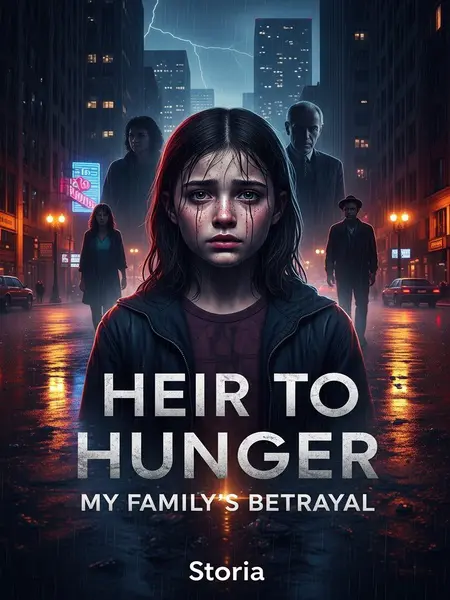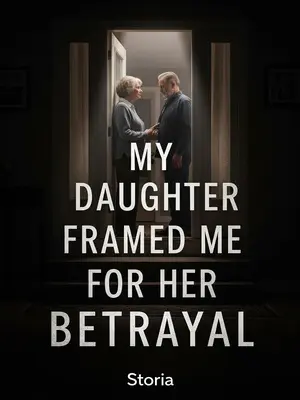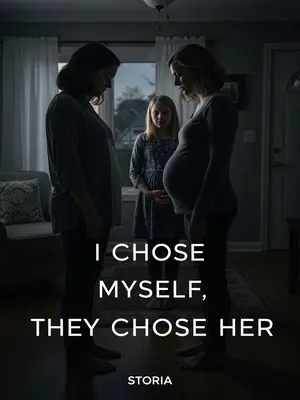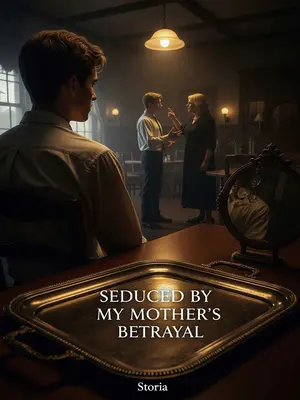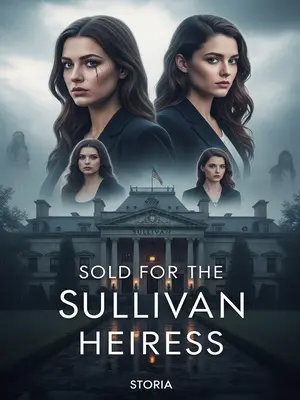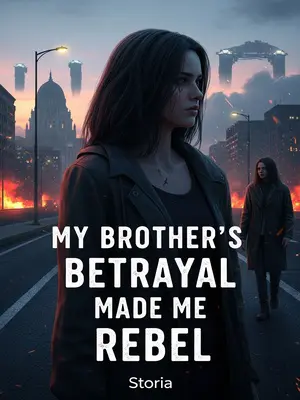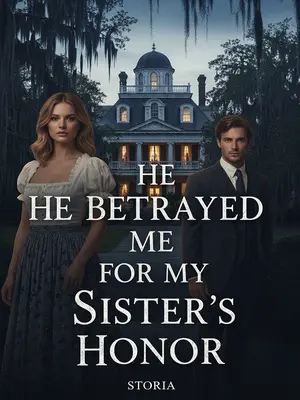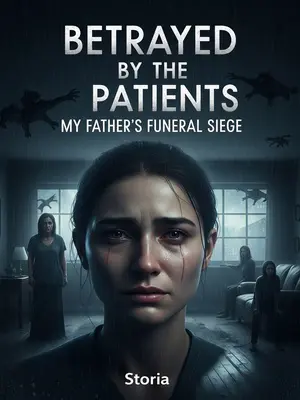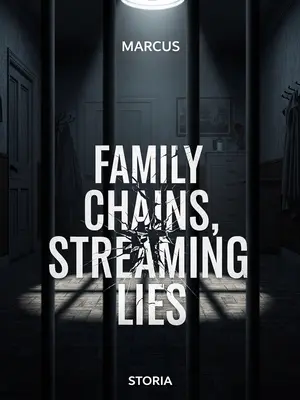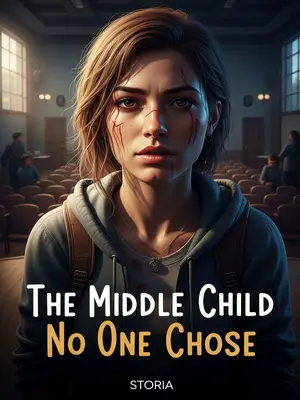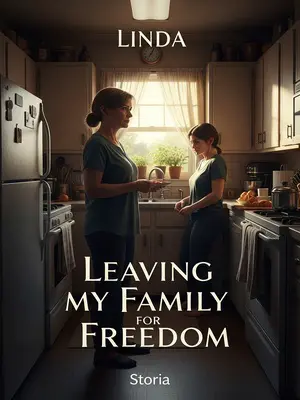Chapter 4: Ashes of Yesterday’s Daughter
How could something I’d just eaten turn so sour and foul so fast?
I wondered the same thing. My stomach ached. I doubled over, breathing through my mouth, trying not to throw up again.
The old woman was already collapsed on the ground, shaking all over.
Her hands were clenched, body trembling. She whispered prayers, eyes squeezed shut, rocking back and forth.
What more was there to figure out?
I could see the truth in everyone’s faces. No one cared about me—only about the mess I’d made.
Uncle snorted coldly.
He turned away, waving a hand like he was swatting a fly. “Enough,” he snapped, voice tight.
“Who gave you the nerve to disobey orders?”
His voice was low, dangerous. The old woman cowered, barely able to speak.
The old woman’s lips trembled, just about to speak, when a gentle voice came from outside the study.
The air shifted. The tension snapped as the sharp click of expensive heels echoed on the floor. I held my breath.
“I told her to do it. Lisa’s daughter—even giving her a bowl of sour oatmeal is too good for her.”
The words drifted in, smooth and cold. I froze, recognizing the voice from stories Mom used to tell.
The person hadn’t arrived, but her voice did first.
The staff straightened, even my uncle’s face changed—just a flicker, but it was there.
A woman dressed in designer clothes, surrounded by staff, walked in slowly.
Her heels clicked, her perfume filled the air. She wore a pale blue dress, her hair pulled into a perfect chignon. She didn’t look at me at first—just at my uncle.
When I saw her face, I was stunned for a moment, almost calling out ‘Mom.’
My heart stopped. For a second, I wanted to run to her, to beg her to save me. But I bit my tongue. I knew better.
But I knew she wasn’t.
She was too polished, too sharp. Mom’s eyes were soft, her hands rough. This woman was steel and pearls.
Mom looked a lot like her, but softer, older, more worn. After being sold to my father, Mom never had a good life.
I remembered Mom’s hands—always busy, always gentle, even when she was tired. She never wore jewelry. Not even a wedding ring.
How could she compare to my pampered Aunt Margaret?
Aunt Margaret’s rings sparkled in the light, her nails manicured to perfection. The diamonds caught the sun, blinding. Her perfume clung to the air, thick and floral.
Aunt Margaret Redford walked up to me, face set like stone. She saw the mess on the floor, covered her nose with a perfumed handkerchief, and I saw a flash of satisfaction in her eyes—so much like Mom’s, but colder.
She looked me up and down, her mouth twisting into a sneer. “Figures,” she muttered, glancing at my uncle. “Just like Lisa.”
“Looks just like Lisa—a tramp’s face. Wasn’t Lisa the one who even seduced her brother-in-law? Where is she?”
Her words were knives. I stared at the floor, wishing I could vanish. My cheeks burned.
I lowered my lashes and said softly, “Give me food, and I’ll take you to her.”
My voice was steady, but inside, I was shaking. I met her gaze, daring her to look away first.
Aunt Margaret looked at me and snorted, “What right do you have to bargain with me?”
She waved her hand, dismissing me. The staff behind her shifted, but no one spoke up. I felt invisible again.
But Uncle frowned and told the staff to bring a plate of hot sandwiches.
He didn’t look at me as he spoke, but his voice was sharp. “Bring her food. Now.”
“Eat! Don’t die in my house. It’s bad luck.”
His tone was harsh, but I heard something else beneath it—maybe guilt, maybe worry. I didn’t care. I just wanted food.
Aunt Margaret glared at him, displeased.
She crossed her arms, lips pressed tight. “You’re too soft,” she said, but Uncle ignored her.
“You’re not feeling sorry for this brat, are you?”
Her voice was sharp, but he said nothing. He just watched me, eyes narrowed.
Uncle shook his head and said nothing, but his gaze on me grew heavier.
I felt his eyes on me as I reached for the sandwiches. Hunger was stronger than shame, and I didn’t care what he thought.
I was starving. I grabbed the sandwiches and devoured them.
The bread was warm and buttery. The cheese was gooey and rich. I ate too fast, barely chewing, afraid someone would snatch them away. For a second, I almost felt happy.
Warm and soft in my mouth—Mom hadn’t lied. The sandwiches were delicious, so much better than wild dandelion cakes. I closed my eyes, savoring every bite.
But I didn’t dare eat too much. Instead, I stuffed the rest into my tattered sleeve.
Old habits die hard. I tucked the sandwiches away, just in case. You never know when your next meal will come.
Uncle’s brow furrowed even tighter as he watched me.
He looked at me like I was a puzzle he couldn’t solve. I wondered if he’d ever felt hungry in his life.
“Your mother didn’t give you anything to eat?”
His voice was softer, almost curious. I shook my head, swallowing hard.
I shook my head.
I wiped my mouth, glancing at the floor. “No, sir,” I whispered, voice small.
“Mom saved all the good things for me to eat.”
It was true, in her own way. She’d go hungry so I could have a crust of bread, a spoonful of soup. I never asked how she managed.
Uncle sneered, full of disgust.
He rolled his eyes, muttering, “Always making excuses. Always.”
“Then why do you still look so pitiful? Are you addicted to acting?”
His words stung, but I didn’t show it. I just stared at my hands, picking at the crust of my sandwich.
I didn’t answer him. I just said blandly, “Let’s go. I’ll take you to Mom.”
My voice was flat, empty. I was too tired to argue, too hungry to care.
Aunt Margaret snorted and ordered the car to be brought around.
She snapped her fingers, and the staff hurried to obey. The sound of keys jangling echoed through the hall.
But she wouldn’t let me get in, saying just seeing me was disgusting, and the air turned sour wherever I went.
She wrinkled her nose, stepping back like I might infect her with poverty. “You can walk,” she said, her voice dripping with disgust.
I watched as my beautifully dressed little cousin was carried into the car, unable to hide the envy in my heart.
Emily clung to her mother, her gold bangles flashing in the sunlight. I stared, wishing I could trade places with her, just for a day. My heart ached with longing.
Mom rarely held me.
Her hugs were awkward, rare. She always seemed afraid she might break me—or herself. I missed them anyway.
Mom said sometimes she wanted to strangle me, because my birth was a mistake.
She’d say it when she was tired, or angry, or just sad. But she always apologized afterward, her eyes wet with regret.
But when she was locked up alone in the basement, I was the only one who could keep her company.
I’d sneak down with scraps of food, stories, anything to make her smile. Sometimes she’d sing me old army songs, her voice echoing in the dark.
And her heart was always soft…
No matter how hard life got, she never stopped loving me. Not really. I clung to that.
Sometimes, when she was in a good mood, she would teach me to read, tell me stories about the Redford family, even teach me self-defense.
We’d sit on the floor, her finger tracing letters on old newspapers. She’d show me how to throw a punch, how to stand tall, even when I felt small. I wanted to make her proud.
But I was too useless—I never learned well.
I tried, but my hands shook, my mind wandered. She’d sigh, but she never gave up on me.
She said the women of the Redford family were just as tough as the men. She herself had earned medals in the army.
She’d point to the faded ribbons in her jewelry box, telling stories about boot camp, about bravery and sacrifice. I believed her.
If she hadn’t been framed, had her knee shattered, and her career ruined, she wouldn’t have ended up like that.
Her eyes would go distant, and I’d know not to ask questions. Some wounds never heal.
She tried to end her life many times, but hatred kept her going.
I’d find her crying in the dark, clutching old photos. She’d whisper that she couldn’t leave me alone, not while her enemies still breathed.
Uncle rode a tall chestnut horse in front.
He looked like a general from one of Mom’s stories, sitting tall and proud. The reins were leather, the saddle shining. I watched him, wishing I could be that strong.
He asked if I could ride by myself. I shook my head.
I stared at the ground, embarrassed. I’d never even touched a horse before. My cheeks burned.
“What did your mother teach you? Are you good for nothing?”
His voice was sharp, but I barely heard it over my pounding heart.
“Yes. I am good for nothing.”
The words came out before I could stop them. I meant them, too. I was nothing. Less than nothing.
I lowered my head, my mind filled with the image of Mom being cut into pieces by Dad, who even tricked me into eating her.
The memory stabbed through me. I squeezed my eyes shut, fighting tears.
And I, this good-for-nothing, couldn’t save her.
My fists clenched, nails digging into my palms. I promised myself, right then, that one day I’d be strong enough. One day, I’d make them all pay.
“You..."
His voice trailed off, caught between anger and something softer. But I didn’t look up. I was already lost in my own world, clinging to the last scraps of hope I had left.
